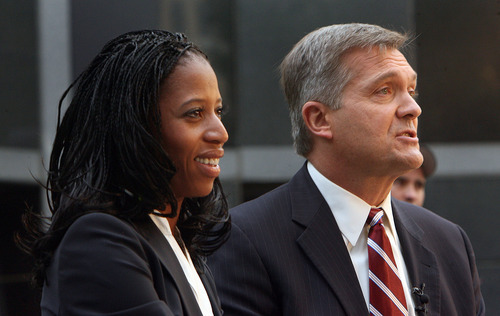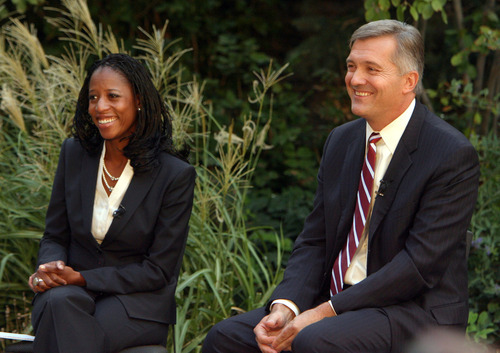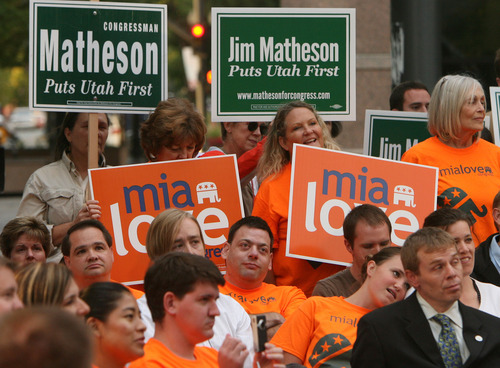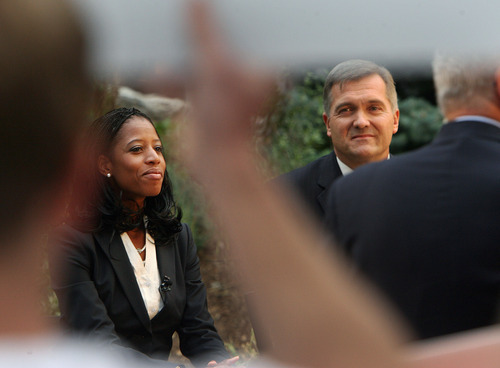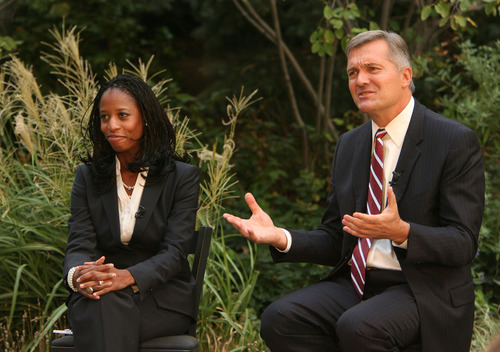This is an archived article that was published on sltrib.com in 2012, and information in the article may be outdated. It is provided only for personal research purposes and may not be reprinted.
Rep. Jim Matheson accused Republican candidate Mia Love of taking a slash-and-burn approach to the federal budget, hurting police and college students, while Love painted Matheson as a big-spending, pro-government Democrat in their first debate Wednesday.
"There's two different directions we can take," Love said. "My opponent is supporting Barack Obama. Which [means] everything ends up with bigger spending, more borrowing and more debt. I've got the support of Mitt Romney [who will] make sure we champion the private sector so you can have a job."
Matheson countered that he has taken a pro-business approach in Congress, which is why groups like the U.S. Chamber of Commerce and National Federation of Independent Businesses, which typically support Republicans, have endorsed him.
"I don't think government should be running our economy. But I think our public policy should encourage economic growth and opportunities," Matheson said.
A few pointed barbs were exchanged during the during the debate sponsored by The Salt Lake Tribune and KUTV — the first encounter between the two contenders in the 4th Congressional District race, which has become increasingly contentious with six weeks to go before the election.
Matheson defended his record of mixed votes on the Affordable Care Act — popularly known as Obamacare — saying he voted against the bill repeatedly before it passed, but against its repeal until the Supreme Court ruled on it, but most recently voted to repeal the bill.
"I've always been opposed to Obamacare," Matheson said, explaining he did not think it would control health care costs. "I thought it was important, I thought it would be reckless in fact for Congress to step in when the [Supreme Court] was acting."
Love accused Matheson of making a political calculation on Obamacare and waiting until the last minute to decide his vote. But Matheson said he had voted against the bill repeatedly in committee, and was clear on where he stood before anyone else from the Utah delegation voted on the measure.
One of the liveliest exchanges came over Love's proposal to eliminate government-subsidized college loans and grants, which 75 percent of Utah students use to help fund college and Love took in order to earn her degree.
Love said government involvement has driven up the cost of tuition and Obama and Matheson want to throw more federal money at it "so the next bubble that's going to burst is education."
"Why are we encouraging people to incur more debt when we can insert the free market system that will bring the cost of tuition down?" she asked. "It has always brought the cost of items down. Always."
Matheson seemed incredulous at her explanation.
"I'd love to wave a magic wand and make costs go down. I don't hear a proposal of how you're going to do that," he said. Business leaders and Gov. Gary Herbert have set a goal of having two-thirds of Utahns obtain a post-high school degree by 2020.
"Utah families know if they want their kids to have a better life they need their kids to go to college," he said.
Love had to defend other budget cuts she has proposed, including eliminating Justice Department grants to local law enforcement agencies.
"I've met with police chiefs throughout the state of Utah," Matheson said, "and to a man they will tell you these programs with the Department of Justice fund anti-gang programs, anti-drug task forces, bullet-proof vests for cops, the national sex offender registry."
Eliminating them would undermine public safety, which is a primary role of government, he said.
Love countered that local governments can decide for themselves what they want to spend on public safety.
"We should be able to keep our money here and make sure we can provide for our local law enforcement without the strings attached," she said.
She also acknowledged that her proposal to cut the Earned Income Tax Credit — given to working Utahns who fall into lower tax brackets — might mean a tax increase for low-income Utahns, but would spread the burden of funding government more equally.
"It says we're all Americans and I believe every American should pay something in this country we know and love," she said. "If you earn an income you should pay something. You should have skin in the game."
Matheson said that President Ronald Reagan called the Earned Income Tax Credit the most effective anti-poverty measure in the country, and Matheson worked with President George W. Bush to expand the program.
"These are people who are working and are paying taxes. They pay payroll taxes, Social Security Taxes and Medicare Taxes," he said. "Her proposal would raise taxes on these very people."
About 190,000 Utahns benefited from the $414 million tax break last year, according to the Treasury Department.
After the debate, Matheson said he felt he showed that Love doesn't understand the practical implications of her proposals and "I don't think they've been very thoughtful." Love did not answer questions after the debate.
The two will meet for their second debate Thursday, which will be televised on KSL.
Twitter: @RobertGehrke


